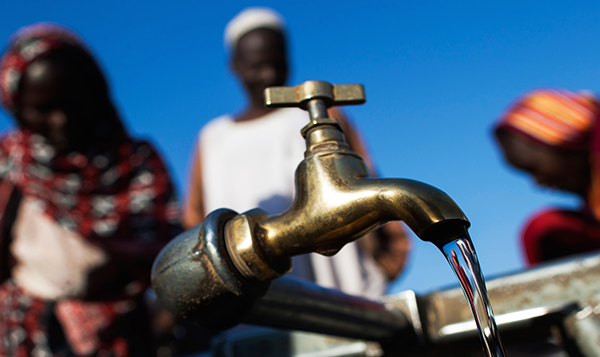SDG 6 Policy Support System
In order to address capacity building for effective use of the SDG-PSS, this online course provides training and teaching on how to use this tool to produce evidence and data on the enabling environment of the SDG 6.


Course Start
Mar 01, 2019

Course End
Dec 31, 2026
Duration
03:00 hours
Certificate
No
The course is also available in  French and
French and  Spanish
Spanish
Introduction
The SDG-PSS is a free, online and secure system developed as a part of the project “Water in the World We Want” by the United Nations University Institute for Water, Environment and Health (UNU-INWEH), the United Nations Office for Sustainable Development (UNOSD), the Korea Environment Corporation (K-eco), the Ministry of Environment, Republic of Korea, and national institutions from Costa Rica, Ghana, Pakistan, and Tunisia.
The SDG-PSS is designed for water-focused policy makers, development actors, and researchers interested in producing reliable, systematic and “fit-for-policy” evidence on the enabling environment for achieving SDG 6. It has been trialed by policy makers and experts from five countries – Costa Rica, Ghana, Pakistan, Tunisia, and Republic of Korea – between 2016 and 2018.
The SDG-PSS provides evidence that is critically needed to define policy on the water-related issues as outlined by the 2030 Agenda and, more specifically, by the SDG 6. It builds upon six critical components: Capacity Assessment; Finance Assessment; Policy and Institutional Assessment; Gender Mainstreaming; Disaster Risk Reduction (DRR)/Resilience Mainstreaming; and Integrity. These components were chosen as they allow a better understanding of the enabling environment in which water and sanitation policies are developed and implemented, and under which conditions the achievement of the SDG 6 remains possible.
The SDG-PSS relies on several years of work around water and sanitation issues and the contributions of different organizations, and draws entirely on the already well-established tools, processes and practices that are commonly used for water-related management at national and international levels. In this way, countries that are used to report data while using such international tools should be able to easily adopt and adapt SDG-PSS for their national reporting systems on SDG 6.
The SDG-PSS is a definite answer to the challenges of bringing data and information from multiple international and national tools and translating them into a “fit-for-policy” evidence framework. Professionals can easily navigate through this user-friendly system by translating the trends and data to support collaborative planning for the development, refinement, and implementation of water and sanitation-related policies.
The e-course
To address capacity building for systematic and effective use of SDG-PSS, the e-course provides training and teaching on how to use this system to produce evidence and data on the enabling environment for achieving SDG 6. Filling the SDG-PSS with data may require significant efforts from various agencies and may be time-consuming, as data may not be promptly available for all targets and indicators of SDG 6. Nevertheless, the effort required by the SDG-PSS to get all the evidence together is an essential step for countries to evaluate better which data is missing and where gaps in policy-making exist.
The SDG-PSS e-course consists of the following modules: introduction to SDG-PSS; accessing SDG-PSS and registering in the system; SDG-PSS components; entering data in the SDG-PSS; and reporting in the SDG-PSS. Each module consists of video lectures, reading supplements, graded evaluations or assignments, and discussion to develop a community of practice. Anyone engaged in this course will be able to share their questions comments about the e-course. The project team will follow up on these questions/comments.
Key learnings
Upon completion of this self-paced e-course, the participants should be able to navigate through SDG-PSS pages and its components; use SDG-PSS to generate and analyze evidence on the national progress and the enabling environment of the achievement of SDG 6.
Intended users
The e-course is designed for water-focused policy makers, practitioners, and researchers.
Module Subjects
- Introduction to SDG-PSS
- Accessing and registering in the system
- SDG-PSS components
- Six critical components
- The component 'Status'
- Entering the data in SDG-PSS
- Reporting in SDG-PSS
Course Outline
Introduction to SDG-PSS
- How to use the e-learning program?
- Important topics on the SDG-PSS
Introduction to the SDG-PSS online
- Introduction to the SDG Framework and the SDG 6
- Introduction to SDG-PSS main objectives
- Introduction to SDG-PSS home page
- Other available documents
Accessing and registering in SDG-PSS
- Introducing the different user levels of the SGD-PSS
- How users request access to the SDG-PSS?
SDG-PSS components
- Definition of the six critical components of SDG-PSS
- How the critical components are reported on the SDG-PSS
- Definition of the component ‘Status’
- How the Status component is reported on the SDG-PSS
Entering the Data in SDG-PSS
- Demonstration of how to enter the data in the questionnaires
Reporting in the SDG-PSS
- Demonstration of the reporting pages of each critical component
- Demonstration of the the Summary View
Requirements
The e-course is designed to water-focused professionals, practitioners, and policy makers from all countries. However, as the SDG-PSS is built upon six critical components, any professional, researcher or policy maker working on SDGs can make good use of the tool to better understand and work with SDGs interlinkages.
Course Developed by
Manzoor Qadir
Assistant Director
United Nations University Institute for Water, Environment and Health
Guillaume Baggio
Research Associate
United Nations University Institute for Water, Environment and Health
Partners



*Course cover photo by Albert González Farran, UNAMID